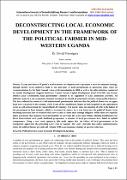| dc.contributor.author | Mwesigwa, David | |
| dc.date.accessioned | 2020-11-11T10:30:16Z | |
| dc.date.available | 2020-11-11T10:30:16Z | |
| dc.date.issued | 2020 | |
| dc.identifier.citation | Mwesigwa, D.(2020). Deconstructing Local Economic Development in The Framework of The Political Farmer in Mid-Western Uganda. International Journal of Interdisciplinary Research and Innovations. Vol. 8, Issue 4, pp: (43-52). | en_US |
| dc.identifier.uri | www.researchpublish.com | |
| dc.identifier.uri | https://hdl.handle.net/123456789/193 | |
| dc.description.abstract | Extant provisions of Uganda’s local economic development seek to promote a rural development strategy through diverse sector initiatives built in the structures of local governments as grassroots units. Since its recommendation, by the Joint Annual review of decentralisation in 2006 as well as the pilot initiatives conducted by Family Development Support Initiatives, United Nations Capital Development Fund (UNCDF) and Kasese District Local Government, local governments continue to be supportive of LED promotion activities. All indicators point to a not-so-pleasant situation occasioned by dearth pf progressive farmers except political farmers. The data collected by means of a self-administered questionnaire indicates that the political farmer has an upper hand over a majority in the country, which is one of the contributory factors to both inequities in the agricultural sector as well as frustrating the vision behind LED strategy. The puzzle, since the adoption of LED, is the failure of the government to beat inequity, which is structural in nature, in a way frustrates the political farmer from becoming successful due to resources they have access to rather than through diligence. While there are requisite policy provisions that mandate local governments to ascertain the active poor before selecting beneficiaries for direct interventions such youth livelihood programme, a number of local governments have failed to uphold transparency. Using a case study approach, this study argues that the failure of local governments to be transparent aggravates the prevailing LED crisis in Uganda. The study concludes that policy implementation where the political farmer prevails will relegate LED to an imaginary strategy of poverty reduction. | en_US |
| dc.language.iso | en | en_US |
| dc.publisher | International Journal of Interdisciplinary Research and Innovations | en_US |
| dc.subject | Political farmer | en_US |
| dc.subject | Local Economic Development | en_US |
| dc.subject | Farming | en_US |
| dc.title | Deconstructing Local Economic Development in The Framework of The Political Farmer in Mid-Western Uganda | en_US |
| dc.type | Article | en_US |

